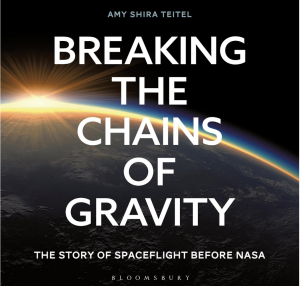Amy Shira Teitel, Revered Author, on the Promise and Perils of Nuclear Space Exploration: Powering the Final Frontier
Teitel says that while nuclear exploration in space holds great potential, it must be guided by caution, safety, and a commitment to the common good.
LOS ANGELES, CA, UNITED STATES, October 21, 2025 /EINPresswire.com/ -- Historian and author Amy Shira Teitel (Fighting for Space; Breaking the Chains of Gravity) examines the growing role of nuclear power in space, warning that while it could revolutionize lunar and Martian exploration, it also poses complex ethical, political, and safety challenges. Teitel urges a thoughtful approach to ensure humanity’s pursuit of progress beyond Earth remains responsible and cooperative.
“Nuclear power in space isn’t new,” says Teitel. “Since 1961, when the U.S. Navy’s Transit 4A satellite first used a radioisotope thermoelectric generator, missions have relied on this dependable energy source where solar power falls short, like during the two-week lunar night or deep-space travel. Power sources like RTGs are essential for exploration, but when we begin considering larger nuclear reactors or building energy infrastructure on the Moon, we’re entering a realm that raises serious legal, political, and ethical questions.”
The 1967 Outer Space Treaty and the United Nations’ 1992 Principles Relevant to the Use of Nuclear Power Sources in Outer Space set a framework: space exploration should benefit all nations, no nation can claim territory in space, and nuclear power must be used safely and transparently. Yet Teitel points out that infrastructure like a nuclear power station on the Moon could, over time, create de facto lines of control around critical resources, challenging the “for all mankind” principle of space exploration.
“Building infrastructure on the Moon could change everything,” says Teitel. “A lunar refueling station could make manned missions to Mars more practical and affordable, turning the Moon into a true gateway to the solar system. But infrastructure in space is expensive, slow, and tangled in geopolitics. If we want it to serve humanity, not divide it, we need cooperative models, like the Antarctic research stations, where nations work together for the common good.”
Through her research and accessible commentary, Teitel bridges history and science, helping the public understand why humanity hasn’t returned to the Moon since 1972, and what the next decades of space exploration might realistically look like.
For more insights, watch Teitel’s The Vintage Space video explaining why lasting lunar infrastructure has yet to be established: https://www.youtube.com/watch?v=4FcuV4hvGDM&t=1s
About Amy Shira Teitel
Amy Shira Teitel is a historian, author, and spaceflight enthusiast dedicated to making the history and science of space exploration accessible to all. She is known for her research on the space race, nuclear power in space, and human spaceflight history, and hosts a popular YouTube channel exploring these topics in detail.
For more information about Teitel, visit her website: https://www.amyshirateitel.com/home.html
Amanda Kent
Boundless Media USA
+1 313-403-5636
email us here
Legal Disclaimer:
EIN Presswire provides this news content "as is" without warranty of any kind. We do not accept any responsibility or liability for the accuracy, content, images, videos, licenses, completeness, legality, or reliability of the information contained in this article. If you have any complaints or copyright issues related to this article, kindly contact the author above.



